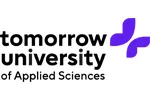We're moving! This site will be relocating to goingto.university in 2026. Please update your bookmarks to the new address.


Germany
Tomorrow University of Applied Sciences| The award | How you will study | Study duration | Course start | Domestic course fees | International course fees |
|---|---|---|---|---|---|
| MSc | Full-time, Part-time, Online | 18 - 24 months | Anytime | EUR 14500 total | EUR 14500 total |
In a world striving for sustainability, mastering circular economy principles is vital. Tomorrow University's Master of Science in Data Analytics for Circular Economy dives into the circular economy, a model focused on resource efficiency and minimizing waste, using data analysis.
With an expert focus on circular economy principles, data analysis, sustainability metrics, and statistical methods, you will learn to optimize circular systems through data-driven decisions.
Program Highlights
What to Expect
Making an Impact with Our Industry Partners
The term "Impact" embodies our commitment to providing an educational experience that aligns with your values and interests, empowering you to make a positive difference in the world. Central to our Impact Master are the core pillars of sustainability, innovation, and technology. These principles guide learners in addressing complex challenges and driving meaningful change within various sectors, allowing them to specialize and deeply engage with these transformative strategies.
Tailored to Your Aspirations
By joining our program, you will access cutting-edge resources, a network of leading industry experts and research institutions, and a support system that extends beyond graduation. Explore the different areas of specialization and discover the program that aligns with your vision for a sustainable future.
Career Opportunities
Graduates will be well-prepared for a variety of impactful roles, including:
Earn your Impact Masters for just €307 per month!
*Scholarships, Early Application Benefit & Study Financing available
Below are some suggested courses at other providers that you may also be interested in:
Preparatory Courses in English for Degree Studies (Medical, Business, Architecture and Engineering, Psychology, English and American Studies) UG:Foundation, UG:Foundation, UG:Foundation
University of Pécs
Find out moreIf you do not meet the entry requirements for this course then consider one of these postgraduate preparation courses from another institution:
There are 36 other courses listed from Tomorrow University of Applied Sciences. A selection of these are displayed below:
Actionable Data Solutions for Sustainability MSc
Tomorrow University of Applied Sciences
Find out moreArtificial Intelligence & Sustainable Technologies BSc
Tomorrow University of Applied Sciences
Find out moreJoin the StudyLink email list and never miss a chance to turn your study abroad dreams into reality!
